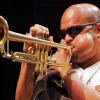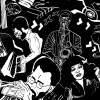Home » Jazz Articles » Reassessing » Derrick Shezbie: Spodie's Back
Derrick Shezbie: Spodie's Back
Produced by fellow Crescent City native Delfeayo Marsalis, "Spodie's Back" is a much more modernistic outing than anything he would have tackled in Rebirth. But unlike the throwback neo-bop so popular with other young jazz lions in the 1990s, this is more of a melding between New Orleans' heritage and mainstream, straight-ahead playing.
This blended approach is reflected in the song selection: Distinctively New Orleans standards like "St. James Infirmary," "Royal Garden Blues," "Paul Barbain's Secondline" and "Dancing at the Mardi Gras" are interspersed with standards like "Softly As In a Morning Sunrise," "Misty" and "I Have Found a New Baby."
Tying it all together throughout is Shezbie's gorgeous playing—melding an immediately recognizable tone with splendid technique. It's easy to see why, when this album was originally released, critics were lavish in their praise. Journalist Scott Yanow gave it 4.5 out of 5 stars, while the All Music Guide wrote that Shezbie was "well on his way into developing into an Armstrong for the next century."
And Yanow's review was spot-on: While the backing band varies here from track to track, with both Branford Marsalis and Ellis Marsalis sitting in, it doesn't seem to matter who is on which song: It's Shezbie's playing that holds our attention. His tone is so pure, his playing so confident, that the act of listening to the music here is one of pure indulgence.
The opening track, "Royal Garden Blues," encapsulates the stylistic blending. The song opens with a traditional three-part horn lead—but a third of the way through, Shezbie takes a solo with a decidedly modern flavor, mixing the theme with swaths of Duke Ellington's "I'm Beginning to See the Light." Mark Turner's solo on tenor sax is even more contemporary, veering into atonal post-bop free jazz. Pianist Victor "Red" Atkins brings the vibe back closer to what Shezbie did, with a straight-ahead solo before Shezbie and Turner begin trading eights for a few bars until the band closes out with the three-horn (trombonist Corey Henry being the third) lead that opened the track.
"Misty" is the most modernistic of all the arrangements here, and is also maybe the least memorable cut. Shezbie's soloing is strong, but the whole thing never seems to click.
Somewhere in between the pure magic of "Royal Garden Blues" and the relative mediocrity of "Misty" is the strikingly original approach to "Softly As In a Morning Sunrise." It opens with a three-horn lead, but with an immediately straight-ahead approach. Shezbie's opening solo is colored by bop sensibilities, which Turner takes a step yet further in his follow-up. Atkins' impassioned piano solo here is reminiscent of Monty Alexander—another player who manages to meld tradition and modernity with seeming effortlessness.
The hype for "Spodie's Back" was not at all misplaced, even if Shezbie's career didn't take the path predicted for him. This remains a treasured listen, one of the more memorable releases from the mid-1990s.
Track Listing
Royal Garden Blues; Softly, As In A Morning Sunrise; Leroy Special; Dusk On The Delta; St. James Infirmary; Spodie's Back; Back O' Town Blues; I Have Found A New Baby; Paul Barbarin's Second Line; Misty; Dancing At The Mardi Gras.
Personnel
Derrick Shezbie
trumpetMark Turner
saxophone, tenorCorey Henry
tromboneVictor "Red" Atkins
pianoMartin Butler
drumsHerlin Riley
drumsAdditional Instrumentation
Greg Williams: bass; Ellis Marsalis, piano; Kirk Joseph, drums; Mark Gross, saxophone; Branford Marsalis, saxophone; Kenny Kirkland, piano
Album information
Title: Spodie's Back | Year Released: 1994 | Record Label: Warner Bros.
Tags
PREVIOUS / NEXT
Support All About Jazz
 All About Jazz has been a pillar of jazz since 1995, championing it as an art form and, more importantly, supporting the musicians who make it. Our enduring commitment has made "AAJ" one of the most culturally important websites of its kind, read by hundreds of thousands of fans, musicians and industry figures every month.
All About Jazz has been a pillar of jazz since 1995, championing it as an art form and, more importantly, supporting the musicians who make it. Our enduring commitment has made "AAJ" one of the most culturally important websites of its kind, read by hundreds of thousands of fans, musicians and industry figures every month.


























